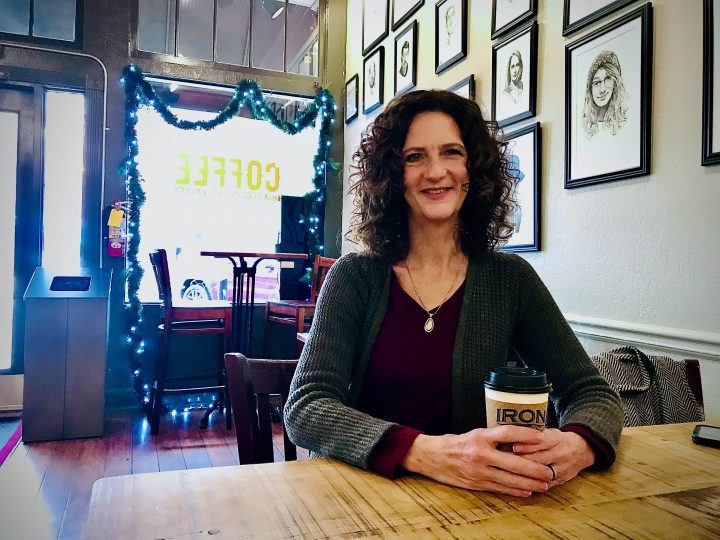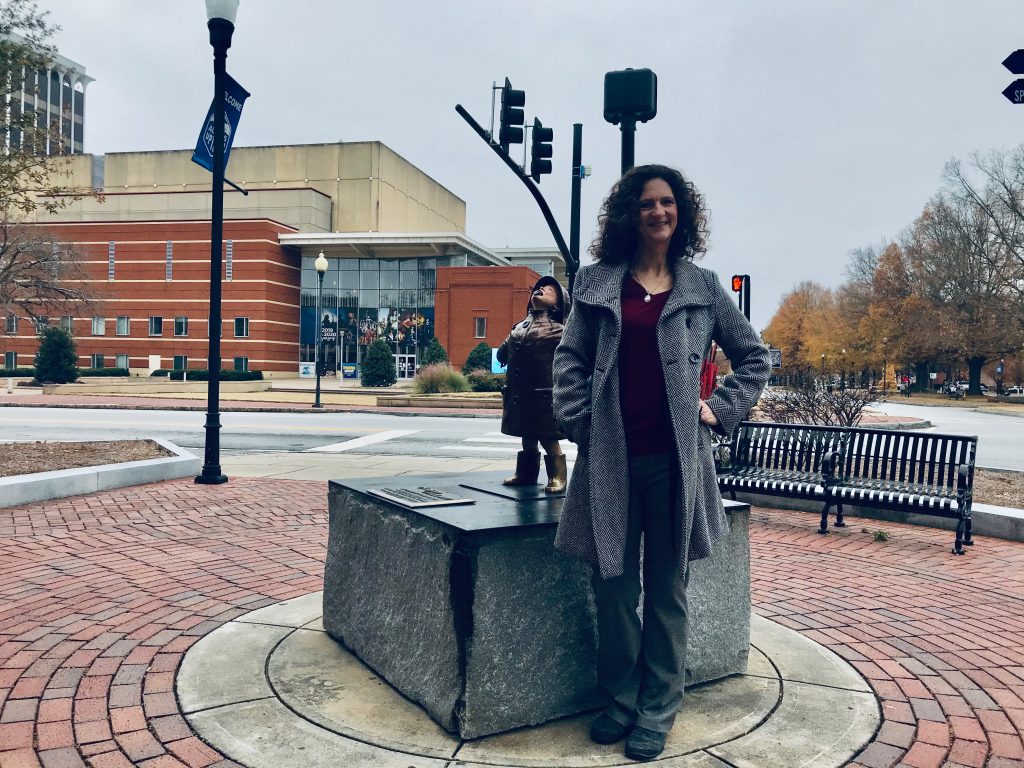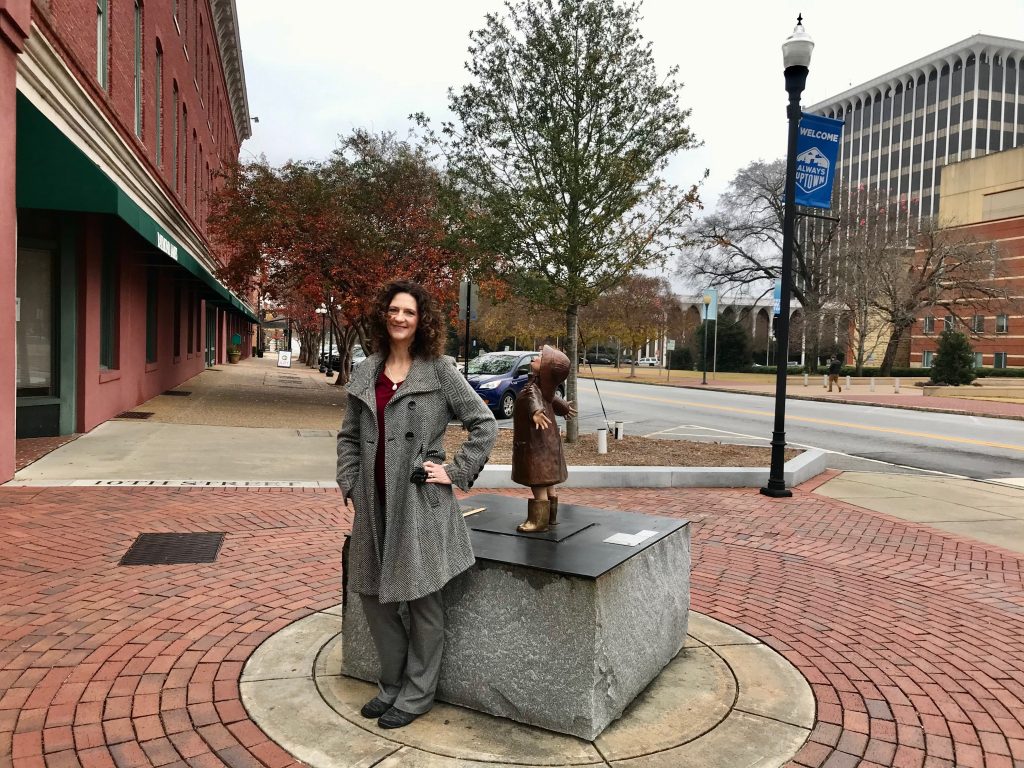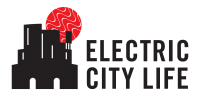
Program Manager, Georgia Center for Opportunity
Admin, Columbus Community Resource Network
What exactly is the Georgia Center for Opportunity?
“The Georgia Center for Opportunity Is a wonderful organization. I’m so blessed to work there with people who have the heart that they have for others and the purpose that they have to make our communities better.
It’s an organization that’s been around in Georgia for a lot of years. What we care about is the belief that every person—no matter where they were born, no matter their race, no matter what mistakes they have made in their past—has the opportunity for a quality education, for meaningful work, and for a happy family life.
Something that we organize our work around is called the Success Sequence. Research shows that of people who follow the sequence in a very specific order—and the sequence would be that they get a good education, then find stable work, and then get married before they having kids—then only 2% of those people end up in poverty. Of the people who do that in any other order, 75% of those people end up struggling.
So what the Georgia Center for Opportunity does is focus on those areas. The area of education, the area of employment, and the area of healthy family. We work with partner organizations—churches, schools, businesses—to look at within our community what needs to be addressed to help people deal with the barriers that they may face. Sometimes it’s through training, sometimes it’s helping connect people with resources, sometimes it’s about community education. It takes a lot of different forms.
Our work is either done on the ground in the community or at the policy level. We are a nonpartisan organization but we do care about influencing and impacting policy that we feel supports a positive and a healthy movement forward in these areas.”

What are some of the problems that you’re hearing about from people here in Columbus?
“We have a huge transportation issue.
People who are stuck in generational poverty, they live in neighborhoods where they don’t have transportation options. In many cases, they don’t have a driver’s license, so they have to use the bus system. Your job opportunities are limited by that. If the bus system doesn’t run past 10 o’clock and you’re working at Wal-Mart and get off at 11, then how are you going to get home?
Child care is a huge issue. Access to quality child care that is affordable is a real challenge.
Then you’ve got people who get into good positions and set goals and are able to begin moving to a place of economic self-sufficiency but they’re on some type of a benefit. They’re getting help with child care, maybe help with health care, or maybe they have help with housing. When they get to a certain point where their income improves just enough, then all of a sudden they lose a portion of that support and they have to pay more for services that they can’t afford.
What if you start to make 50 cents more an hour but that costs you $3 an hour in benefits? What decision are you going to make?”
What is your role within that organization as program manager for Hiring Well, Doing Good?
“The program stemmed from some efforts that were going on in Atlanta years ago that caused the leadership at the Georgia Center for Opportunity to see these huge barriers when you’re talking about employment.
It might be transportation. It might be child care. It might be criminal background. All these things that hinder people from being able to find work that is sustainable and meaningful and allows them to continue to advance economically. That led them to have an event called Hiring Well, Doing Good. Because of the response to that, it launched this program.
The program right now is active in Atlanta and in Columbus. As we are setting that foundational structure in place, it will be launched in other communities throughout Georgia and potentially in other states.
Our mission is working with community partners to recruit, to train people to enter the workforce who are chronically unemployed or under-employed, and in effect begin to re-engage them in a way that’s needed to improve the local economy.
Our first goal is to assess what people need and help connect them to the right resource to get the support they need. We have job coaches to help people one-on-one as they’re setting goals, as they’re preparing resumes, as they’re preparing for interviews. And as we expand that network of employers, we’ll be even better able to connect them to viable job opportunities.”
How does your work in that role tie into the Columbus Community Resource Network?
“The Columbus Community Resource Network was born in part due to COVID. We found ourselves in March with everything shutting down and the leadership at the Georgia Center for Opportunity said, ‘How can we help support connectivity?’
Although there’s already a lot of connectivity in Columbus, they felt these pages would help us be able to share resources and share information. It was launched for that purpose. What it’s developed into in my mind is a way to help us all get on the same page. It’s really helpful as a community to start to use the same terminology. When I use the term welfare cliff, it’s important that the person I’m talking to understands what that really means.
The more our community understands what people who are living in poverty are struggling with, the better our community is able to come forward and support them.”
Could you imagine doing this job without using social-media?
“Yeah, actually I could. Even though my background is marketing, and I’ve had to use a lot of social media, it’s not my favorite place to share.
Part of the reason for that is I prefer face-to-face conversations. I think sitting across the table from someone and hearing from them is a much better way to understand each other. There’s too much division that comes in when people start reacting to information on social media. That division is not helping us, ultimately, because the strength that we find, either within our communities, or within our nation, is the strength that comes from us joining together in solidarity. And so the more division we see, we’re not as strong. Unfortunately, social media plays a role in that division.
So it’s not my favorite place to be, but I do think it’s important. The relationships we have that connect us and our community, and the opportunities we have to develop those relationships, at the core, that’s way more important than shooting out information on a social channel.”
How does Columbus stack up versus the rest of the state of Georgia as far as opportunity?
“We have a really high poverty rate.
If you look at the Columbus MSA, it’s a little under 19%. If you look at just look at the city of Columbus, it’s about 21-22%. But no matter how you look at it, it’s high.
I’m involved with the Chattahoochee Valley Poverty Reduction Coalition. When we look at poverty and what it would take to move someone out of poverty, we look at 200% of the federal poverty level. Because we feel like the 100% level is way too low. It’s nothing. For a family of four, the 200% level is close to $50,000 a year. Which is what we believe is more reasonable to actually being able to support your family.”
“Leading economists and business leaders from Columbus and the surrounding area will discuss the economic forces and trends that have arisen during the pandemic to shape the labor landscape. This includes an examination of the business policies and practices that impact workforce participation.” 11 a.m. Thursday, January 21st
What have you seen as far as our community’s response to COVID?
“Right at the get-go, I was so inspired by the ability of our community and its leaders to come together and find ways to support the needs of people that were constantly changing.
Betsy Covington at the Community Foundation and Ben Moser at United Way very early put together these COVID Response calls. Their efforts and the efforts of others to join hands and find solutions that help in the moment is so inspirational.
That heart in our community is something you don’t find everywhere. I hope that it’s in other communities. I don’t know that it is. I feel that genuine desire to work together is something special about Columbus.
Moving on, as we’ve addressed the immediate needs in Columbus, we have a series of events next year focused on the changing COVID workforce. One of those events in March is going to look at how we leverage our community assets to mitigate the impact of COVID? Betsy and Ben are going to be speakers at that event and help us think through what we have done and done really well and how that may be applicable in the future.
We have two other events—one in January, one in March—where we’re going to be looking at the employment situation specifically. We’re going to look at the labor-supply gaps that exist. We’ve got a pretty low average wage in Columbus. So when you talk about the stimulus and the money the government has put out to help people mitigate the impact COVID, I think in some cases I think it’s impacted Columbus a little bit more. And not in a positive way. Because if someone earns a wage that’s on the lower side and they’re getting money from the government, when the business starts to open back up and they’re trying to hire, that person is less inspired to go back to work because they’re not going to be earning what they’re earning sitting at home.
That’s impacting certain businesses and their ability to open back up or take on additional work. In some cases, employers have had the opportunity to take on new business but weren’t able to do that because they’ve had to scale down their workforce. But that opens up some important conversations about average wage and living wage in Columbus, because it’s important for someone to earn enough to support their family.”
Is it hard for you to not to take your job personally? To take it emotionally in certain situations?
“It can be.
Part of it is that I want to see people succeed so badly. When you find somebody who’s really motivated, I want to do everything possible to take away those barriers and help them move ahead. In that situation, I love it. It’s perfect. But when I want to help somebody so badly and they’re just not ready yet to do the work themselves, it’s hard. We can’t cause somebody to be motivated. You just can’t create that motivation.
Truly, that’s the hardest thing. To see people in bad situations that could make a real difference in their lives if they just saw their real value. Maybe they don’t see their real value quite yet. I think that’s the toughest challenge—seeing people who have so much potential but they’re not ready yet to do what they need to do.”
What inspires you to go to work everyday?
“Knowing that what our community is doing and the work I’m doing is creating positive change. Even if it’s not a change I’m going to see overnight, it is a seed.
From all the testimonials I hear about the positive things we’re working on, we’re starting to see the results of the seeds that have been planted over the last several years. Everyday I know that I am planting seeds and I know it’s going to grow—tomorrow, 5 years down the road, or 10 years down the road.
Those high-level goals that we have to reduce poverty—the seeds that I’m planting, the seeds that every person in all the organizations in our community are planting—are going to come together so we see that change happen.”

Education: Shaw High School. Bachelor’s degree in Marketing, Columbus State University; Master’s degree in Business Administration, Columbus State University.
Professional background: “For 12 years, I was Marketing Manager for Continuing and Professional Education at Columbus State University. In 2016, I moved into operations. That led to me to Leadership Columbus and to what I’m doing now—which is really community development as much as it is workforce training.”
Family: Husband (Steve); son Brendon stationed in San Antonio.Texas with the Air Force; daughter Ashleigh lives in Fredericksburg, Virginia with her husband and children.
Best places in Columbus to take out-of-town visitors: “I love coming downtown. There’s so much to do and see. I like the National Infantry Museum. I like to take my grandkids to the Columbus Museum. I love to drive around and look at the historic houses.”
Worst change in Columbus in recent years: “The increase in poverty. And as we’ve seen the increase in these areas where people are really struggling, we’ve seen everything move more north and those areas die. What I don’t like about that is people separating themselves instead of supporting and integrating with the people who are struggling. The more isolated people that are living in neighborhoods that are chronically impoverished, the deeper they end up falling.
How can we go back into those neighborhoods and help people see how they can pull themselves out? Not hand them something. But give them the tools to build their own neighborhoods in a very positive way.”
Best change in Columbus in recent years: “These public-partnerships that have allowed us to do these great things. Look at downtown Columbus. This was not even the same place 15 years ago. I think other parts of Columbus can learn a lot from what we’ve been able to do downtown.”
